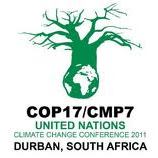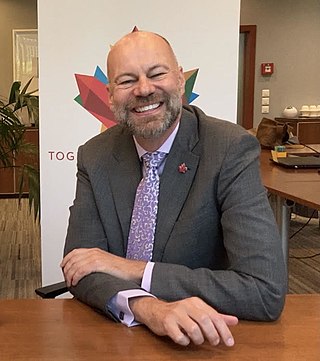
The Kyoto Protocol (Japanese:京都議定書,Hepburn:Kyōto Giteisho) was an international treaty which extended the 1992 United Nations Framework Convention on Climate Change (UNFCCC) that commits state parties to reduce greenhouse gas emissions,based on the scientific consensus that global warming is occurring and that human-made CO2 emissions are driving it. The Kyoto Protocol was adopted in Kyoto,Japan,on 11 December 1997 and entered into force on 16 February 2005. There were 192 parties (Canada withdrew from the protocol,effective December 2012) to the Protocol in 2020.
The United Nations Framework Convention on Climate Change (UNFCCC) is an international treaty among countries to combat "dangerous human interference with the climate system",in part by stabilizing greenhouse gas concentrations in the atmosphere. It was signed in 1992 by 154 states at the United Nations Conference on Environment and Development (UNCED),informally known as the Earth Summit,held in Rio de Janeiro. Its secretariat was in Geneva at first but relocated to Bonn in 1996. The treaty entered into force on 21 March 1994. "UNFCCC" is also the name of the Secretariat charged with supporting the operation of the convention,with offices on the UN Campus in Bonn,Germany.

JoséMaría Figueres Olsen is a Costa Rican businessman and politician,who served as President of Costa Rica from 1994 to 1998. He also ran for president in the 2022 presidential election but was defeated by Rodrigo Chaves.

The United Nations Institute for Training and Research (UNITAR) is a dedicated training arm of the United Nations system. UNITAR provides training and capacity development activities to assist mainly developing countries with special attention to Least Developed Countries (LDCs),Small Island Developing States (SIDS) and other groups and communities who are most vulnerable,including those in conflict situations.

Han Seung-soo is a South Korean politician and diplomat. He served as Prime Minister of the Republic of Korea from 29 February 2008 to 28 September 2009. He was the United Nations Secretary-General Ban Ki-moon's Special Envoy on Climate Change (2007–08) and for Disaster Risk Reduction and Water (2013–18),Special Advisor to the UN/World Bank High-Level Panel on Water (2016–18),Member of the UN Secretary-General's Advisory Board on Water and Sanitation Agency,Member of the UN Secretary-General's High-Level Panel for Global Sustainability,Founding Chair of Global Green Growth Institute,Temasek International Panel Member (2004–18) and Independent Non-Executive Director of Standard Chartered plc (2010-2019).

Patricia Espinosa Cantellano is a Mexican diplomat who served as the executive secretary of the United Nations Framework Convention on Climate Change from 2016 to 2022. She was Secretary of Foreign Affairs in the cabinet of President Felipe Calderón;and served as Mexican Ambassador to Austria,Germany,Slovenia and Slovakia. Because of her diplomatic career,she was appointed Ambassador Emeritus of Mexico in 2012.
Post-Kyoto negotiations refers to high level talks attempting to address global warming by limiting greenhouse gas emissions. Generally part of the United Nations Framework Convention on Climate Change (UNFCCC),these talks concern the period after the first "commitment period" of the Kyoto Protocol,which expired at the end of 2012. Negotiations have been mandated by the adoption of the Bali Road Map and Decision 1/CP.13.

Kevin Mark Conrad,born in the United States to parents living in Papua New Guinea in 1968,is a Papua New Guinean businessman and environmentalist. He grew up in the Arapesh tribe near Wewak,East Sepik Province and graduated from Ukarumpa High School in the Eastern Highlands Province.
OneClimate is a nonprofit internet climate news,social activism and social networking site. It received international media attention during the 2007 United Nations Climate Change Conference for its 'Virtual Bali' initiative,and also during the COP15 event in Copenhagen.

The 2010 United Nations Climate Change Conference was held in Cancún,Mexico,from 29 November to 10 December 2010. The conference is officially referred to as the 16th session of the Conference of the Parties (COP 16) to the United Nations Framework Convention on Climate Change (UNFCCC) and the 6th session of the Conference of the Parties serving as the meeting of the Parties (CMP 6) to the Kyoto Protocol. In addition,the two permanent subsidiary bodies of the UNFCCC —the Subsidiary Body for Scientific and Technological Advice (SBSTA) and the Subsidiary Body for Implementation (SBI) —held their 33rd sessions. The 2009 United Nations Climate Change Conference extended the mandates of the two temporary subsidiary bodies,the Ad Hoc Working Group on Further Commitments for Annex I Parties under the Kyoto Protocol (AWG-KP) and the Ad Hoc Working Group on Long-term Cooperative Action under the Convention (AWG-LCA),and they met as well.

Karen Christiana Figueres Olsen is a Costa Rican diplomat who has led national,international and multilateral policy negotiations. She was appointed Executive Secretary of the UN Framework Convention on Climate Change (UNFCCC) in July 2010,six months after the failed COP15 in Copenhagen. During the next six years she worked to rebuild the global climate change negotiating process,leading to the 2015 Paris Agreement,widely recognized as a historic achievement.

Avoided Deforestation Partners, or AD Partners, is a non-profit organization under the auspices of the Center for International Policy in Washington,D.C. AD Partners is involved in the global effort to solve climate change by working to end deforestation in tropical rainforest countries. By avoiding the practice of deforestation,i.e.,clearing forests to provide inexpensive farmland,the world gains the significant climate benefits of not releasing carbon into the atmosphere. In addition,avoiding deforestation also allows forests to sequester carbon and scrub the air of pollutants. Beyond protecting the Earth's air quality,tropical forests facilitate conditions for rain,replenish water sources,provide habitats for myriad plant and animal species,and sustain the livelihoods of 1.6 billion people globally. Leading scientists and economists say that ending deforestation is the most cost effective and scalable method of reducing greenhouse gases. In fact,they believe that ending deforestation will cut the timeframe for solving the climate crisis in half.

Nick Nuttall is a freelance communications consultant and former Director of Communications and Outreach and Spokesperson for the UN Environment headquartered in Nairobi,Kenya and the UN Framework Convention on Climate Change headquartered in Bonn,Germany.

The International Day of Forests was established on the 21st day of March,by resolution of the United Nations General Assembly on November 28,2013. Each year,various events celebrate and raise awareness of the importance of all types of forests,and trees outside forests,for the benefit of current and future generations. Countries are encouraged to undertake efforts to organize local,national,and international activities involving forests and trees,such as tree planting campaigns,on International Day of Forests. The Secretariat of the United Nations Forum on Forests,in collaboration with the Food and Agriculture Organization,facilitates the implementation of such events in collaboration with governments,the Collaborative Partnership on Forests,and international,regional and subregional organizations. International Day of Forests was observed for the first time on March 21,2013.

The 2011 United Nations Climate Change Conference (COP17) was held in Durban,South Africa,from 28 November to 11 December 2011 to establish a new treaty to limit carbon emissions.

The Green Climate Fund (GCF) is a fund established within the framework of the United Nations Framework Convention on Climate Change as an operating entity of the Financial Mechanism to assist developing countries in adaptation and mitigation practices to counter climate change. The GCF is based in Incheon,South Korea. It is governed by a Board of 24 members and supported by a Secretariat.

The United Nations Climate Change Conference,COP19 or CMP9 was held in Warsaw,Poland from 11 to 23 November 2013. This is the 19th yearly session of the Conference of the Parties to the 1992 United Nations Framework Convention on Climate Change (UNFCCC) and the 9th session of the Meeting of the Parties to the 1997 Kyoto Protocol. The conference delegates continue the negotiations towards a global climate agreement. UNFCCC's Executive Secretary Christiana Figueres and Poland's Minister of the Environment Marcin Korolec led the negotiations.
Janos Pasztor is a Hungarian diplomat. His current role is Senior Fellow at the Carnegie Council for Ethics in International Affairs and Executive Director of the Carnegie Climate Geoengineering Governance Initiative. He was Assistant Secretary-General in the Executive Office of the Secretary-General of the United Nations in New York City and Senior Adviser to the Secretary-General on Climate Change between January 2015 and December 2016. Previously he has held positions at the World Wide Fund for Nature International where he was Policy and Science Director and acting Director for Conservation.

Martha Rojas Urrego is a biologist,ecologist and humanitarian,gender and environmental advocate. She is a Colombian and French national. In August 2016 she was appointed as the Secretary General of the Ramsar Convention on Wetlands. Previously she was Head of Global Advocacy and Acting Deputy Secretary General at humanitarian organization CARE International.

Stephen de Boer is Canada's Permanent Representative to the World Trade Organization in Geneva,Switzerland. His appointment began on August 21,2017.
















